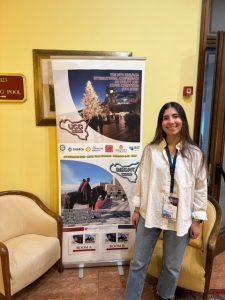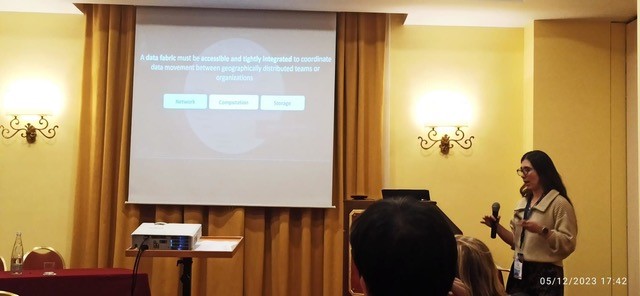UT’s Global Computing Laboratory (GCLab), led by EECS Dongarra Professor Michela Taufer, had two papers accepted at the 16th IEEE/ACM International Conference on Utility and Cloud Computing. The conference was held in Taormina, Italy from December 4–7.
Paula Olaya, a senior PhD student in the group, represented GCLab at the conference. She delivered a 20-minute lecture and fielded ten minutes of questions for each paper.
“Being able to represent UT and GCLab at an international conference was a huge responsibility that I felt honored to have,” Olaya said. “Acceptance to a conference is the payoff of all the hard work of doing research. Conferences are the showcases where people engage with our work and find value in it.”
One of the papers Olaya presented introduced the Soil Moisture Spatial Inference Engine (SOMOSPIE), an application that creates fine-grained soil moisture predictions in aid of earth science research. GCLab developed the application in collaboration with Ewa Deelman at the University of Southern California, Miron Livny at the University of Wisconsin-Madison, and Rodrigo Vargas at the University of Delaware.
The other paper demonstrated GCLab’s new testbed for the National Science Data Fabric (NSDF), a holistic ecosystem to facilitate the daily research needs of scientists. The new testbed integrates networking, storage, and computing services, helping decrease time-to-discovery across many scientific domains. It was created in collaboration with Christine R. Kirkpatrick at the University of California San Diego and the San Diego Supercomputer Center, Valerio Pascucci at the University of Utah, and Jay Lofstead at Sandia National Laboratories.

“The engagement from the audience was incredible,” Olaya said. “Fortunately, all of the suggestions I got were things we and our collaborators have already discussed as next steps. Getting such a great response shows that our projects are based on a good understanding of the scientists and their needs. It also told me that I am in the right place to do research and develop tools that are impacting sciences.”